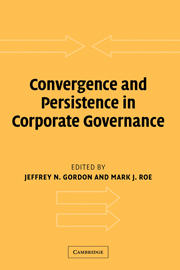Book contents
- Frontmatter
- Contents
- List of figures
- List of tables
- List of contributors
- Acknowledgments
- Introduction
- PART I Systemic issues
- PART II Government players
- PART III Specific institutions
- 8 The politics of corporate convergence
- 9 Ungoverned production
- 10 Convergence of substantive law and convergence of enforcement: a comparison
- 11 Cross-shareholding in the Japanese keiretsu
- Index
8 - The politics of corporate convergence
Published online by Cambridge University Press: 04 March 2010
- Frontmatter
- Contents
- List of figures
- List of tables
- List of contributors
- Acknowledgments
- Introduction
- PART I Systemic issues
- PART II Government players
- PART III Specific institutions
- 8 The politics of corporate convergence
- 9 Ungoverned production
- 10 Convergence of substantive law and convergence of enforcement: a comparison
- 11 Cross-shareholding in the Japanese keiretsu
- Index
Summary
Background and motivation: types of convergence theory
Convergence theories come in several varieties. One account discovers a tendency towards the rules that are, in fact, objectively best, by some efficiency standard. This account identifies the main purpose of corporate law – to minimize the costs of raising capital – and discovers the optimal rules to achieve this purpose. On this view, once one stipulates to certain basic features of capitalist social organization (private property, dispersed wealth for investment), there is no reason in the end to doubt that one can identify the single set of most desirable rules. Recent work comparing national corporate systems casts some doubt on the most sweeping form of this functionalist claim. On the basis of this work, it is arguable that there are multiple sets of efficient corporate governance institutions, each set supported by a different set of underlying legal rules (or by the different practices produced by the interaction of laws and various nonlegal norms and sanctions). Given multiple efficient systems, there is no prima facie functionalist reason for convergence to occur. The existence of these multiple sets seems to fall out of the debates over the past decade about the relative effectiveness of the very different systems of the various advanced industrial countries and from more recent data pointing to substantial similarities in corporate performance, by various measures, such as executive turnover and acquisition rates.
- Type
- Chapter
- Information
- Convergence and Persistence in Corporate Governance , pp. 293 - 309Publisher: Cambridge University PressPrint publication year: 2004
- 7
- Cited by



